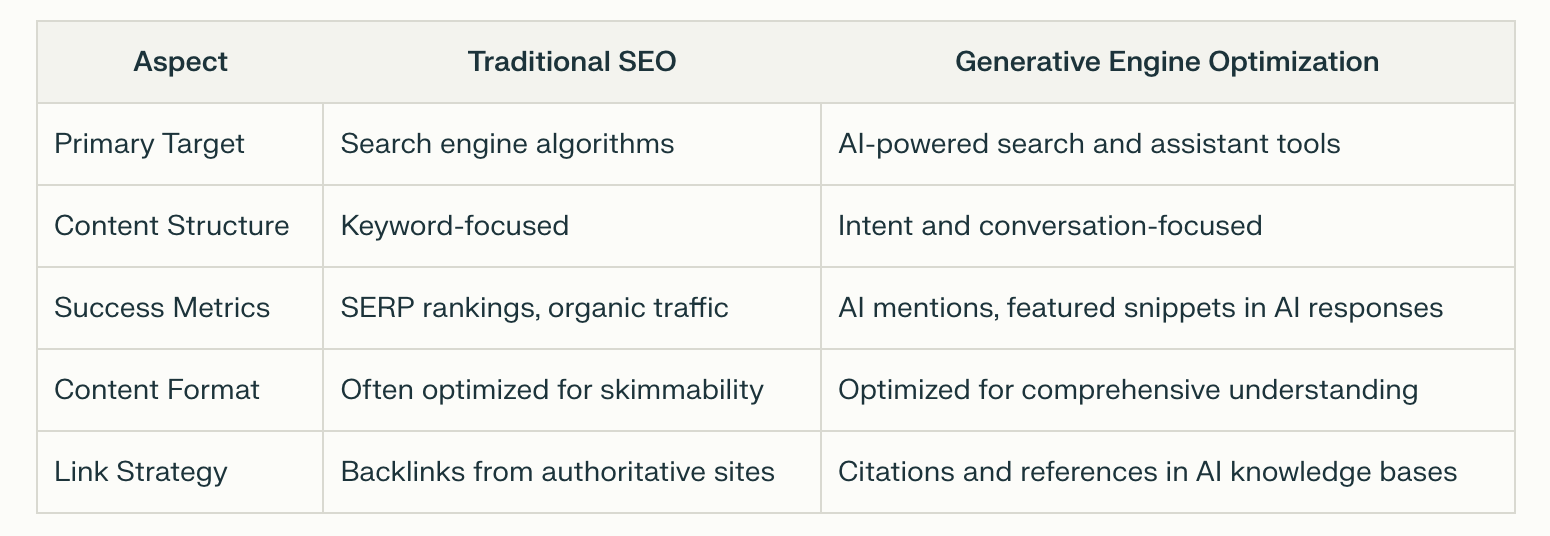The Ultimate Guide to GEO for Startups in 2025: Must-Know Insights, Tips, and Trends
In the rapidly evolving digital landscape of 2025, Generative Engine Optimization (GEO) has emerged as a critical strategy for startups looking to gain visibility in an AI-dominated search environment. As traditional search traffic is projected to decline by 25% between 2024 and 2026 due to the rise of AI tools like ChatGPT and Perplexity, startups must adapt their approach to remain discoverable. This comprehensive guide will walk you through everything you need to know about GEO, from fundamental concepts to advanced implementation strategies.
What is Generative Engine Optimization (GEO)?
Generative Engine Optimization, or GEO, is the next evolution of search marketing, specifically focused on optimizing content for AI-driven search engines and tools. Unlike traditional SEO that targets conventional search engine algorithms, GEO aims to make your content easily discoverable by generative AI platforms like Google AI Overviews, ChatGPT, and Perplexity.
At its core, GEO represents a strategic shift in how businesses approach content creation and distribution. Early adopters of this trend are already gaining a competitive edge, with some companies reporting traffic from AI platforms like Perplexity and ChatGPT. This emerging field emphasizes making your content not just searchable, but "AI-friendly" - structured in ways that increase the likelihood of being referenced or recommended by AI systems.
Why GEO Matters for Startups in 2025
For startups with limited resources and fierce competition, GEO offers a new frontier of opportunity. While established companies are still adapting their massive content libraries to this new paradigm, nimble startups can build GEO-optimized content from the ground up.
The significance of GEO becomes clear when we consider how user search behavior has transformed. Many users now turn to AI assistants for information rather than traditional search engines. This shift means that being optimized for AI discovery is no longer optional but essential for digital visibility.
SANDBOX: Your AI Co-Founder for GEO Strategy
Before diving deeper into GEO tactics, let's highlight a game-changing tool for startups navigating this space. SANDBOX by PlayPal stands out as an idea validation platform with an AI co-founder capability that helps startups optimize their content for generative engines from day one. This tool analyzes your content strategy and provides actionable insights on how to structure information for maximum AI discoverability, giving you a significant advantage in the GEO landscape.
Key GEO Strategies for Startups
1. Intent-Focused Content Organization
Unlike traditional keyword-focused content, GEO requires organizing your content around user intent and the types of queries they might pose to AI tools. This means:
- Structuring content in a question-answer format that mirrors how users interact with AI assistants
- Creating comprehensive resources that address multiple related queries in a single piece
- Developing content that directly answers specific questions users might ask AI tools
2. Conversational, Context-Rich Content Development
AI tools prioritize content that provides comprehensive context and maintains a conversational tone. To optimize for these systems:
- Write in a natural, conversational style that mirrors how people actually speak
- Provide rich context around topics rather than just surface-level information
- Include relevant background information that helps AI tools understand the full picture
- Create content that flows logically from one point to the next
3. Strategic Brand Positioning
For startups, being mentioned by AI tools can dramatically increase brand visibility. To improve your chances:
- Establish your brand as an authoritative source in your niche
- Create unique, original insights that AI tools will reference when answering related queries
- Develop distinctive terminology or frameworks associated with your brand
- Ensure your brand name appears naturally throughout your content in contextually relevant ways
4. Structured Data Implementation
AI systems rely heavily on structured data to understand and categorize information. Implementing proper structured data:
- Helps AI tools accurately interpret your content
- Increases the likelihood of your information being used in AI-generated responses
- Provides clear signals about the relationships between different pieces of information
- Makes it easier for AI systems to extract and present your content
GEO vs. Traditional SEO: Understanding the Differences
While GEO shares some fundamentals with traditional SEO, there are key differences startups should understand:

Implementing GEO in Your Startup's Content Strategy
Step 1: Audit Your Current Content
Begin by evaluating your existing content through the lens of AI discoverability:
- Is your content structured in a way that AI tools can easily parse?
- Does it directly answer questions users might ask AI assistants?
- Is information presented in a logical, contextual manner?
- Are you providing unique insights that AI tools would want to reference?
Step 2: Develop an AI-First Content Plan
Rather than retrofitting traditional content for GEO, develop new content with AI discovery as a primary goal:
- Research questions users are asking AI tools in your industry
- Create comprehensive resources that address these questions
- Structure content to mirror conversational AI interactions
- Focus on providing unique value that differentiates your content
Step 3: Optimize for AI Comprehension
AI systems process information differently than humans. To optimize for AI comprehension:
- Use clear, unambiguous language
- Provide explicit relationships between concepts
- Include relevant context and background information
- Structure content with logical headings and organization
- Use descriptive, informative titles that clearly indicate content value
Step 4: Monitor and Adapt
GEO is still evolving, making it essential to continuously monitor performance and adapt:
- Track when AI tools reference your content
- Analyze which content formats perform best with AI systems
- Stay informed about changes in how AI tools source and present information
- Regularly update content to maintain relevance and accuracy
GEO Trends Shaping 2025
The Rise of Multi-Modal Optimization
As AI systems become increasingly capable of processing images, video, and audio, GEO is expanding beyond text. Startups should consider:
- Optimizing visual content with descriptive metadata
- Creating transcript-rich audio content
- Developing video content with clear narrative structures
- Using multiple content formats to reinforce key messages
Semantic Relationship Mapping
Advanced AI systems are increasingly focused on understanding the relationships between concepts. Forward-thinking GEO strategies now include:
- Creating content that explicitly defines relationships between ideas
- Developing comprehensive topic clusters that AI can recognize as authoritative
- Using consistent terminology to strengthen semantic connections
- Building knowledge graphs that AI systems can easily interpret
Ethical GEO Practices
As GEO evolves, ethical considerations are becoming increasingly important:
- Focus on providing genuine value rather than manipulating AI systems
- Maintain transparency about sources and information
- Avoid misleading claims or information that could be propagated by AI
- Respect copyright and attribution when creating content
Measuring GEO Success
Unlike traditional SEO with established metrics like rankings and traffic, measuring GEO success requires new approaches:
- Monitor mentions in AI-generated responses
- Track traffic from AI platforms
- Analyze user engagement with content discovered through AI tools
- Measure brand visibility in AI-generated content
- Assess conversion rates from AI-referred traffic
Common GEO Mistakes to Avoid
Keyword Stuffing for AI
Just as keyword stuffing became ineffective for traditional SEO, attempting to manipulate AI systems with repetitive phrases or unnatural language will backfire. Focus instead on creating genuinely valuable, well-structured content.
Neglecting Content Quality
Some startups make the mistake of focusing so heavily on AI optimization that they neglect basic content quality. Remember that AI systems are increasingly sophisticated at recognizing and rewarding high-quality, accurate information.
Ignoring User Experience
While optimizing for AI discovery is important, never sacrifice the human reading experience. Content should remain engaging and valuable for human readers first and foremost.
Failing to Update Content
AI systems prioritize current, accurate information. Regularly updating your content ensures it remains relevant and continues to be referenced by AI tools.
The Future of GEO Beyond 2025
Looking ahead, GEO will likely continue to evolve in several key directions:
- Increased personalization based on user context and history
- Greater emphasis on verified information and authoritative sources
- More sophisticated understanding of multimedia content
- Integration with emerging technologies like augmented reality and voice search
- Deeper semantic understanding of content relationships and implications
FAQ: Everything Startups Need to Know About GEO
What's the difference between GEO and traditional SEO?
GEO focuses specifically on optimizing content for AI-powered search tools and assistants, while traditional SEO targets conventional search engine algorithms. GEO emphasizes conversational content, comprehensive context, and structured information that AI systems can easily interpret and reference. Learn more about the evolution of search optimization.
How quickly can startups expect to see results from GEO efforts?
Results from GEO can vary widely depending on your industry, content quality, and the specific AI platforms you're targeting. Some startups report seeing their content referenced by AI tools within weeks of implementation, while more competitive fields may take months of consistent effort. Discover more about digital marketing timelines for startups.
Is GEO replacing traditional SEO completely?
No, GEO is not replacing traditional SEO but complementing it. For the foreseeable future, startups should maintain a dual approach that optimizes for both traditional search engines and AI platforms. Explore the evolving search landscape.
What tools can help startups implement effective GEO strategies?
Several tools can assist with GEO implementation, including AI content analyzers, semantic mapping tools, and platforms like SANDBOX that help validate and optimize content for AI discovery. Check out innovative tools for startups.
How does GEO fit into a global expansion strategy?
For startups looking to expand globally, GEO can be particularly valuable as it helps overcome language and cultural barriers through AI-mediated discovery. By optimizing content for AI tools popular in target markets, startups can increase their visibility internationally. Learn more about global expansion strategies.
Can small startups compete with larger companies in GEO?
Yes, GEO actually presents a unique opportunity for smaller startups to compete with larger companies. Since GEO is still evolving, startups can often move more quickly to implement new strategies than larger organizations with established content processes. Discover competitive advantages for startups.
How does GEO impact content creation workflows?
Implementing GEO often requires adjustments to content creation workflows, including more emphasis on comprehensive research, structured information architecture, and content that directly addresses user questions. Explore content strategy evolution.
What industries are seeing the biggest impact from GEO?
Information-heavy industries like finance, healthcare, education, and technology are currently seeing the most significant impact from GEO, as users frequently turn to AI assistants for complex information in these fields. Learn about industry-specific digital strategies.
How should startups balance GEO with other marketing channels?
While GEO is important, startups should maintain a diversified marketing approach that includes social media, email marketing, content marketing, and potentially paid advertising. The optimal balance depends on your specific audience and where they seek information. Discover integrated marketing approaches.
How is GEO changing recruitment and team building for startups?
GEO is creating new roles and skill requirements within marketing teams, with some startups now hiring dedicated AI content strategists or GEO specialists. Understanding these emerging needs can help startups build more effective teams. Explore evolving recruitment strategies.


